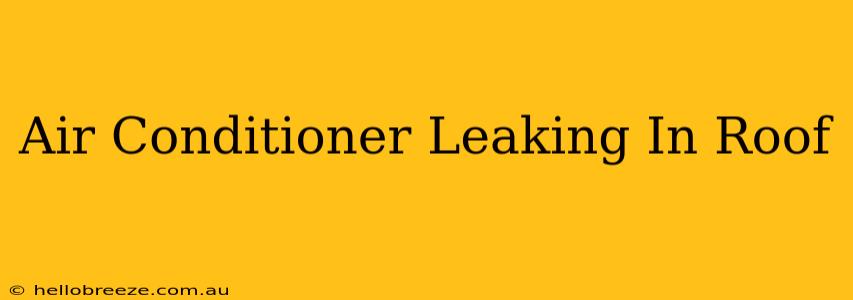A leaky air conditioner can quickly turn a comfortable home into a soggy disaster. Discovering water leaking from your roof near your air conditioning unit is alarming, but understanding the causes can help you address the problem effectively. This comprehensive guide will explore why your AC might be leaking into your roof, offering solutions and preventative measures to safeguard your home.
Common Causes of AC Leaks in the Roof
Several factors contribute to air conditioner leaks in the roof. Identifying the root cause is crucial for a lasting solution. Here are some of the most common culprits:
1. Condensation Issues:
- Clogged Drain Line: The most frequent cause is a blocked condensate drain line. Your AC unit produces condensation, and this water needs to drain properly. A clogged line, often due to algae, mildew, or debris, leads to overflow and leakage into your roof.
- Improper Slope: The drain line needs a slight slope to ensure efficient drainage. If the slope is inadequate or nonexistent, water will pool and potentially leak.
- Frozen Drain Line: A frozen drain line can cause a backup and subsequent leak. This often happens in colder climates.
2. Refrigerant Leaks:
While less common, refrigerant leaks can indirectly lead to roof leaks. Low refrigerant levels cause the unit to freeze, potentially leading to ice build-up which can melt and cause water damage. A refrigerant leak requires professional attention.
3. Damaged AC Unit:
- Cracked or Leaking Components: A crack in the AC unit's casing or a leak in a component can allow water to escape and seep into your roof.
- Poor Installation: Improper installation of the unit, including inadequate sealing around the penetration points in the roof, is a major contributor to leaks.
4. Roofing Issues:
- Damaged Flashing: The flashing (metal material around the AC unit) protects the roof from water intrusion. Damaged or improperly installed flashing allows water to enter.
- Roof Leaks: Sometimes, a roof leak unrelated to the AC unit might be mistaken as an AC leak. Inspect your roof thoroughly to rule out other sources.
Troubleshooting and Solutions
Before calling an HVAC professional, consider these troubleshooting steps:
- Check the Drain Line: Locate the condensate drain line and ensure it's clear of obstructions. You might need a wet/dry vacuum or a plumbing snake to clear blockages.
- Inspect the AC Unit: Carefully examine the unit for any visible cracks or leaks.
- Check for Ice Buildup: Ice formation indicates potential refrigerant issues or a frozen drain line.
When to Call a Professional:
If you're uncomfortable working with your AC unit, or if the problem persists after troubleshooting, it's crucial to call a qualified HVAC technician. Attempting repairs yourself could worsen the problem and void any warranties. A professional can accurately diagnose the issue and provide the necessary repairs.
Preventing Future Leaks
Preventing AC leaks requires proactive measures:
- Regular Maintenance: Schedule annual AC maintenance to prevent problems before they occur. This includes cleaning the drain line and inspecting for any leaks or damage.
- Proper Installation: Ensure your AC unit is installed correctly by a qualified professional.
- Roof Inspection: Regularly inspect your roof for any damage or deterioration, especially around the AC unit.
- Proper Flashing: Ensure the flashing around the AC unit is in good condition and properly sealed.
Ignoring an air conditioner leak can result in significant water damage, mold growth, and costly repairs. By understanding the causes, troubleshooting effectively, and taking preventative measures, you can protect your home and ensure years of reliable air conditioning. Remember, professional help is always a wise investment when dealing with potentially complex HVAC issues.

